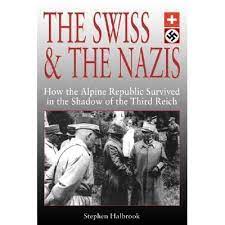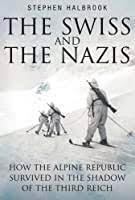GoodReads meta-data is 253 pages, rated 3.66 by 93 litizens.
Genre: History.
Verdict: Whitewash.

The book presents the recollections of scores of survivors of the war in an oral history interspersed with contemporary newspaper accounts, and German Abwehr and diplomatic reports. The Swiss speak of Switzerland as a Will-State, that is, it is willed to exist. This they did 1939-1945 as never before or since.
The oral history speakers are school teachers, insurance agents, doormen, clerks, road workers, journalists, train conductors, shop keepers, factory workers, hausfraus, children, and so on. There are no decision-makers and very little from the political perspective, though the army figures prominently.
According to this account the Swiss made all the efforts within their grasp to will Switzerland to survive by turning the country into an armed camp. Inspired by Finland’s resistance to the Soviet Union and chastened by the collapse of Norway, Netherlands, and the others, the Swiss spared no effort.
However much the Swiss did, there is no doubt that the reason it survived was the German quagmire on the Eastern Front. The gigantic scale of the Nazi war in Russia consumed all the mental energy and war material available first in preparation and then in execution. After the defeat of France in June 1940 and when by late September 1940 it was apparent that the Luftwaffe would not establish the aerial dominance needed for a seaborne invasion of England, Hitler turned his attention Eastward, and there it stayed. Because of that preoccupation Switzerland survived, as did Sweden.
That is hindsight, of course, no one knew that at the time, and especially not from September 1939 to June 1940 when the Swiss made considerable efforts to defend the country. Unlike the flatlands of Poland, Netherlands, Denmark, northern France, the Swiss had a major ally in its topography. All those steep mountains with their few narrow passes on the eastern side nearest Germany and its vassal Austria were readily fortified, ergo the initial strategy was frontier defence.
That strategy had to change when the fall of France opened up the possibility of an invasion from the West. At one time Hitler dangled the possibility before Vichy prime minister, Jean Darlan, that France occupy the Geneva region of Switzerland provided it did so with its own arms, not requiring German assistance. How serious this possibility was remains unknown to this correspondent. Nonetheless the threat remained that Germany itself might invade from its bases in France, a threat that flared up in November 1942 when Germany occupied Vichy France after the Allied landings in North Africa.
Be that as it may, the Swiss had to prepare for the worst, and in so doing changed the grand strategy from border defence in the East to a Réduit national in the fastness of the Alps. The Swiss army would withdraw to an area in the mountains where it built more than 2000 fortifications, mined all the passes, roads, and bridges, and could put a maximum of 850,000 men under arms in concrete bunkers cut into mountains, that number represented about a fifth of the population. Food was stockpiled, rations were cut, ammunition was stored in vast cave arsenals, and so on. Munitions factories and hospitals were moved into caverns. Supplies might last a year if husbanded carefully. The prospect of a costly stalemate for a six months or longer would discourage the Germans from trying, was the reasoning.
Much is made of the Swiss tradition of universal male military service which allowed it to mobilise more soldiers faster than any other European state. I saw some of this myself in Zurich once long ago. Nothing is said of the implication of such a Redoubt, namely that most of the country would be yielded to the invader without a fight. Odd that.
After emphasising the fear of and hostility to the Nazis throughout the nation, how would most of its citizens feel about being left to fend for themselves passes in silence. Made me think of tiresome politicking over the so-called Brisbane Line in Australia, which by the way was mostly the figment of the post-war political imagination, but has found its way into history books by repetition.
The oral histories of this book are repetitive and seldom enlightening. One is reminded of that sociologist Harry Lime’s observation in June 1945 there was not a Nazi in Germany, and by October 1945 there never had been any at all.
The author emphasises the German Army (Abwehr) intelligence reports which found that the Swiss would fight and fight well. Yes, this archival material is interesting, but it is at least as interesting for what it tells us about the Abwehr as about Switzerland. Abwehr was always gloomy and always exaggerated the strength of opponents. Its reports on France implied that German would lose a war there. Hitler routinely discounted these Cassandra songs. see Ernest May, Strange Victory (2000), discussed elsewhere on this blog.
We now know that the head of the Abwehr, Wilhem Canaris used these reports to temper German aggression for reasons of his own. A biography of this enigmatic man is discussed elsewhere on this blog for clickers.
The author explicitly sets aside the matter of banking. Likewise but implicitly he ignores the possibility that a letter-neural Switzerland might have suited Germany as did Sweden and Turkey. They became windows on the world and were used for that. The book touches on this in a chapter on espionage, but there was also currency trading, import and export, medicines, precision tools, precious metals, and more that passed through these countries, including many people going both ways. There was a tenuous air service from Zurich to Lisbon, and a ground link to Genoa for sea cargo existed.
In some sort of agreement, which the author does not mention, the Germans controlled several Swiss border train stations like that at Basel. I had hoped to learn more about this, having passed through that station myself, and knowing it was a barrier to German refugees who tried to get into Switzerland like the novelist Thomas Mann.
There is virtually nothing about the indigenous Nazi movement, though there was one. Moreover, these sympathisers and German agents harassed and in some cases kidnapped or murdered German citizens who had fled to Switzerland like Eric Remarque. Not a word on that subject is to be found in these pages.
Because the book is arranged chronologically there is much repetition, say when the author parades German diplomatic reports that complain of Swiss hostility to Nazism. The author takes these reports at face value, but it was routine for German diplomats to make such complaints in case they were later needed to mask some atrocity. Austria was characterised in the same way before the Anschluss; yet on the day it was received with tumultuous rapture.

My point is not a demand for moral purity, but a request for an explicit discussion of the compromises that had to be made with the devil.
There are a lot of typos, many the failure to capitalise the first letter in words, especially ‘polish’ (for the people, not the shine) but also many others like ‘maginot.’

